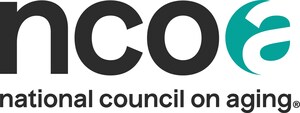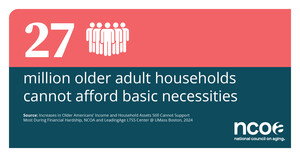In Hard Economic Times, NCOA Offers Programs to Help Older Americans Build Economic Security
WASHINGTON, Jan. 24, 2011 /PRNewswire-USNewswire/ -- One in six older Americans lives below the federal poverty line, according to a new government analysis which almost doubles the number of very poor seniors compared to the standard estimate.
(Logo: http://photos.prnewswire.com/prnh/20100615/NCOALOGO)
At 16%, the proportion of seniors living in poverty is also higher than the proportion of all Americans in poverty. The plight of poor women is particularly striking: 43% of Hispanic women who live alone, and 34% of black women who live alone, live in poverty, according to Supplemental Poverty Measure Research, an alternative calculation from the U.S. Census Bureau. The Supplemental Poverty Measure is a U.S. Census research tool that considers previously overlooked costs like out-of-pocket medical expenses and taxes that can create economic stress for seniors on fixed incomes.
"Too often, the struggles of elder poverty are invisible to policymakers and the public, yet millions are suffering and millions more are living on the edge of a financial crisis," said Sandra Y. Nathan, PhD, Senior Vice President of Economic Security at the National Council on Aging (NCOA), the leading nonprofit service and advocacy organization for older Americans. "Many seniors desperately need help assessing and navigating the options available to assist them in getting on a pathway to economic security, to meet their basic needs, survive an emergency, and afford medical care," Dr.
Nathan added.
With the first Boomers turning 65 this year, and savings, investments, and housing values still reeling from the economic downturn, the number of seniors who are struggling to make ends meet is likely to continue to grow.
NCOA's Economic Security Initiatives Offer Solutions: Putting It All Together
Since many low-income older adults face multiple challenges, NCOA has launched a pilot program to provide economic casework, a one-on-one, holistic approach to solving problems of economic security through financial counseling, education, and benefits coordination, or "financial planning for the rest of us."
At twelve locations nationwide, NCOA's Economic Security Service Centers have helped more than 700 older adults develop personalized "economic action plans." These plans help seniors find out what benefits they are eligible for and navigate an often confusing and fractured network of public and private programs.
"Economic Action Plans" may include:
- Employment and training assistance, including the Senior Community Service Employment Program (SCSEP) and Senior Environmental Employment (SEE).
- Financial and legal counseling, including bankruptcy and eviction assistance, and debt counseling.
- Health insurance counseling, including help with prescription drugs and Medicaid.
- Housing assistance, including foreclosure mitigation, reverse mortgage counseling, and property tax relief.
"In this current economy, aging service organizations often find themselves stretched to try to assist clients with hard-to-solve financial problems that they feel ill-equipped to handle," said Ramsey Alwin, Director of NCOA's Economic Security Initiative. "Through NCOA's national demonstration we are building the network's capacity to better assist older adults struggling with financial issues. Already the majority of clients have increased their economic security, with clients in New York City experiencing an average increase of 13% or more," Ms. Alwin added.
NCOA's Economic Security Service Centers launched in April 2010 with support from the Harry and Jeanette Weinberg Foundation. In December 2010, the demonstration expanded and deepened its work in communities with the support of the Bank of America Charitable Foundation.
NCOA Promotes Economic Security for Older Adults
NCOA also offers a portfolio of programs to help seniors build their economic security by finding and accessing the benefits and services for which they are eligible, including:
- BenefitsCheckU p.org, a free online screening tool that searches over 2,000 federal, state, local, and private programs that help seniors pay for prescription drugs, utility bills, meals, health care, and other needs.
- Job Training and placement, through the Senior Community Service Employment Program (SCSEP) and Senior Environmental Employment (SEE) programs, offering low-income people age 55 and over the training to build their skills and the confidence to find jobs and supplement their incomes.
- Home Equity and Reverse Mortgage Counseling helps millions of seniors make prudent use of the equity in their homes and "use their home to stay at home."
About NCOA
The National Council on Aging is a non-profit service and advocacy organization headquartered in Washington, DC. NCOA is a national voice for older Americans - especially those who are vulnerable and disadvantaged - and the community organizations that serve them. It brings together non-profit organizations, businesses and government to develop creative solutions that improve the lives of all older adults. NCOA works with thousands of organizations across the country to help seniors find jobs and benefits, improve their health, live independently and remain active in their communities. For more information, visit www.NCOA.org.
SOURCE National Council on Aging
WANT YOUR COMPANY'S NEWS FEATURED ON PRNEWSWIRE.COM?
Newsrooms &
Influencers
Digital Media
Outlets
Journalists
Opted In






Share this article